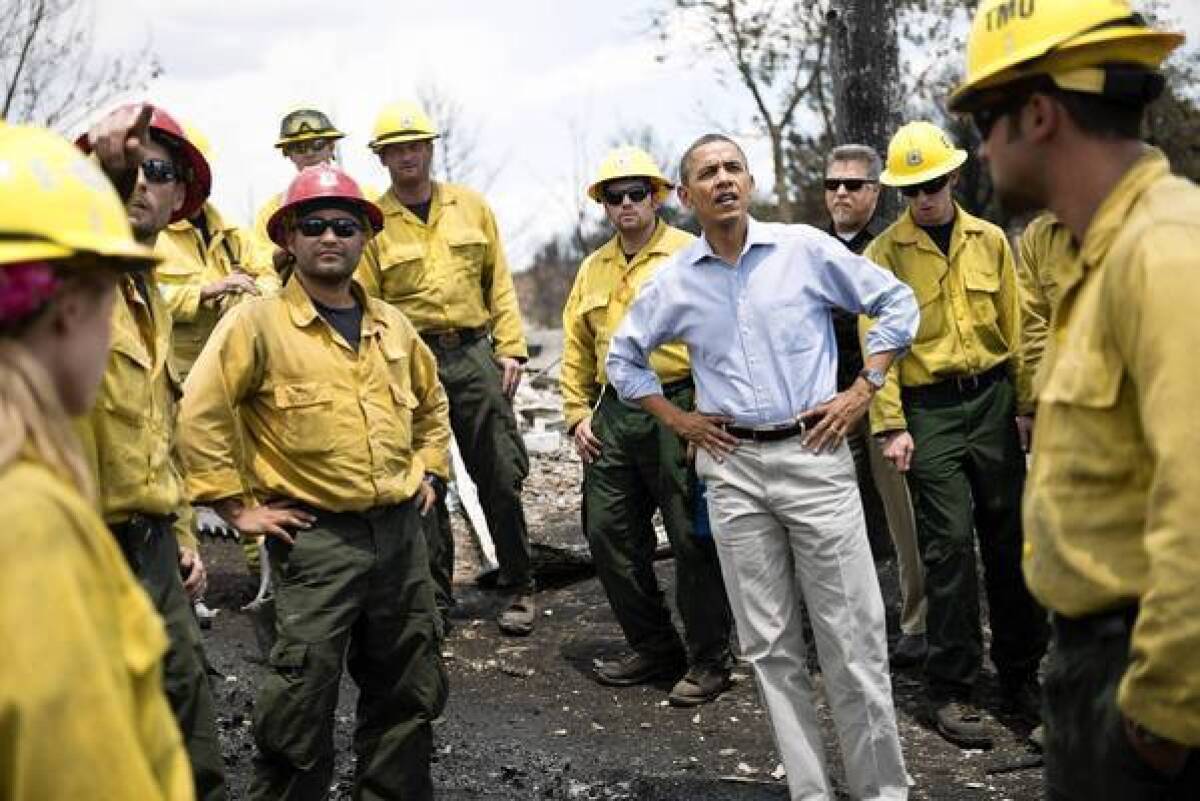No rest for President Obama after healthcare victory

WASHINGTON — The day after the Supreme Court dealt him a major victory, President Obama moved on to fighting other fires — literally — as he traveled to Colorado to check on a blaze that has destroyed hundreds of homes.
The moment captured a truth about Obama’s tenure: From the day he took office in the midst of an economic crisis, he has rarely had the luxury of a victory lap.
Instead, in a stubbornly lackluster economy, the most that administration officials generally can claim is credit for avoiding disasters, achievements typically followed by questions about when that sad state of affairs will improve.
When the health law passed in 2010, White House officials toasted the victory with champagne on the Truman balcony. By contrast, since Thursday’s decision upholding the law, the mood has been decidedly heads-down.
One staff member, in an account typical of others, said he had allowed himself a sigh of relief before turning to other business — including the vote in the Republican-controlled House of Representatives to hold Atty. Gen. Eric H. Holder Jr. in contempt of Congress.
“We don’t really get a chance to celebrate,” said the senior administration official, who spoke anonymously because he was not authorized to discuss the subject publicly. “We have to keep moving on the battle plan.”
That plan doesn’t call for much talk about healthcare between now and November, further dampening any urge to celebrate.
White House and campaign aides have pretty much conceded that the law will remain unpopular with large swaths of voters, at least for now. A Gallup poll earlier this year, for example, found that only about one-quarter of Americans thought that the law, once fully in place, would make their family’s healthcare better, while about a third thought it would make no difference. Almost 4 in 10, including most Republicans, thought it would make things worse.
Administration officials hope that when the health law is fully up and running in 2014 — assuming it survives — Americans will warm to its coverage guarantees and its subsidies to help people buy insurance. They predict, sometimes through gritted teeth, that if they prevail, the law will start becoming popular somewhere around the middle of the decade.
For now, though, while they plan to push back against Republican attacks, Obama’s team doesn’t expect to win a lot of votes by talking about healthcare — at least not in English. Spanish may be another story. Among Latino voters, healthcare has been a top priority, and the Obama campaign has advertised the benefits of the law extensively in Spanish.
Two sets of figures help explain why: Among all Americans, 16% lack health coverage and therefore stand to benefit directly from the new law. But among Latinos, roughly a third do. And Latino voters, by 48% to 20%, believe the health law was a good idea, an NBC News/Wall Street Journal poll showed this week.
At the moment, however, it is Republican leaders who seem thrilled to talk about healthcare, even though they were generally viewed as the losers on Thursday. For them, the issue provides an opportunity to intertwine two favorite attacks against the White House — the healthcare law and new taxes — into one argument, even if doing so leads away from their more straightforward focus on jobs and the economy.
Sen. Mitch McConnell of Kentucky, the Senate’s Republican leader, said Friday that the court “blew the president’s cover” on taxes by labeling as a tax the law’s fine on people who don’t obtain coverage. The decision “turns the president’s campaign rhetoric on its head,” McConnell said.
“They’re going to say it’s time to move on and not want to talk about it because it’s so unpopular. But guess what? We’re going to talk about it,” said Virginia Gov. Bob McDonnell, a Republican.
Obama, meantime, spent a good part of the day talking not about healthcare but wildfires. Accompanied by Sen. Michael Bennet (D-Colo.), he flew over charred mountaintops before landing in Colorado Springs, where he visited a badly burned area, praised firefighters and offered disaster assistance to a state that happens to be a key electoral battleground.
In the Mountain Shadows neighborhood, Obama saw homes burned to their foundations, with water still spewing from exposed pipes and cars in the driveways melted down to their frames.
“When natural disasters like this hit, America comes together,” he said. “We’ve got to make sure that we have each other’s backs.”
Washington, of course, tends more toward stabbing backs than watching them, and on healthcare, both sides have weapons in hand.
House Republicans have set a July 11 vote on repealing the healthcare law, a symbolic move since the Senate has no plans to follow suit, but one very popular with Republican voters. They will aim to convince voters that undoing the president’s signature domestic achievement will help the economy.
Democrats plan to dismiss these Republican efforts as just more politics. Senior administration officials said they wouldn’t try to dodge discussion of the healthcare law’s unpopular individual mandate because they know they can’t. But the answers to those questions will inevitably point to two words: Romney and Massachusetts.
The combination of a mandate and tax was a central element of Mitt Romney’s healthcare overhaul when he was governor of Massachusetts. Maryland Gov.Martin O’Malley, the head of the Democratic governor’s association, was eager to share that fact on Friday.
The tax penalty in the Obama law “would only affect 2% of the entire public,” he said, “and was a penalty provision that was also in Romneycare.”
Kathleen Hennessey and Lisa Mascaro in the Washington bureau contributed to this report.
More to Read
Get the L.A. Times Politics newsletter
Deeply reported insights into legislation, politics and policy from Sacramento, Washington and beyond. In your inbox three times per week.
You may occasionally receive promotional content from the Los Angeles Times.












